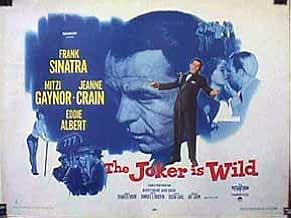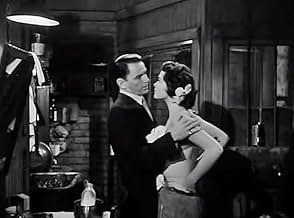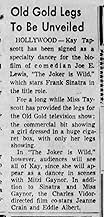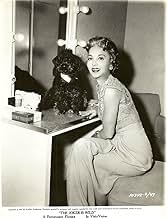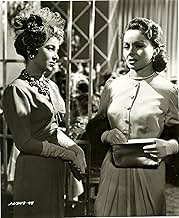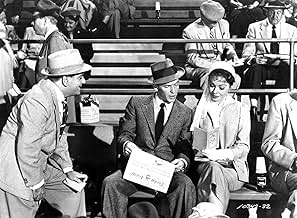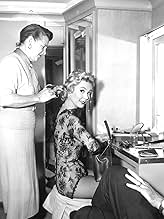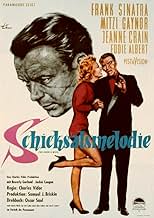Aggiungi una trama nella tua linguaFrank Sinatra plays Joe E. Lewis, a famous comedian of the 1930s-50s. When the movie opens, Lewis is a young, talented singer who performs in speakeasies. After he bolts one job for another,... Leggi tuttoFrank Sinatra plays Joe E. Lewis, a famous comedian of the 1930s-50s. When the movie opens, Lewis is a young, talented singer who performs in speakeasies. After he bolts one job for another, the mob boss who owns the first speakeasy has his thugs try to kill Lewis. He survives, b... Leggi tuttoFrank Sinatra plays Joe E. Lewis, a famous comedian of the 1930s-50s. When the movie opens, Lewis is a young, talented singer who performs in speakeasies. After he bolts one job for another, the mob boss who owns the first speakeasy has his thugs try to kill Lewis. He survives, but his vocal cords are cut and he cannot sing. Several years later, his buddy tracks him d... Leggi tutto
- Regia
- Sceneggiatura
- Star
- Vincitore di 1 Oscar
- 1 vittoria e 1 candidatura in totale
- Doorman at the Copacabana
- (non citato nei titoli originali)
- Vegas Speciality Dancer
- (non citato nei titoli originali)
- Nightclub Patron
- (non citato nei titoli originali)
- Radio Announcer on Loudspeaker
- (voce)
- (non citato nei titoli originali)
- Waiter
- (non citato nei titoli originali)
Recensioni in evidenza
In the 1920s, Lewis is a singer on his way up. Then he tries to part ways with a mobster who thinks he owns the singer and threatens violence if the singer thinks otherwise. Sure enough, Lewis's bid for freedom ends with his larynx slashed and his head busted in. Years later, Lewis re-emerges as a popular nightclub comic, but he's still haunted by what could have been, not to mention a taste for the bottle he works into his stage show a lot better than he does into his life.
Sinatra likened himself to Lewis; he jokes about the two of them forming an Olympic Drinking Team with Dean Martin on his classic "Sinatra At The Sands" album. Perhaps he saw a chance to portray a kindred spirit and a close friend on screen, but watching Sinatra's gritty, unsentimental performance, given at the peak of his career, suggests a deeper agenda. Even Sinatra's friendliest biographers say the man had a dark side, and certainly that is Lewis's situation here, a celebrity who falls into a deeper gloom the more he succeeds, lashing out at those who love him. He's fundamentally decent, but a manic-depressive streak runs deep inside him, coiled around his heart like a rattlesnake.
There's a scene, just after Lewis's wife leaves him, when his faithful pianist Austin Mack (Eddie Albert) suggests Lewis cancel the show. Lewis's reply is the classic entertainer's problem: "What would I do instead?" I get the feeling Sinatra knew that all too well.
Charles Vidor directs this film with assurance and a deft touch, giving Sinatra's early scenes the proper brooding background and his later ones a sense of instability as he amuses his audiences with his cocktail-fueled banter while worrying his friends, who hear the cynicism-bordering-on-nihilism just beneath the surface. The irony of Lewis's life is the bleaker it becomes, the funnier he gets. "I'm fine, I'm fine," he says after passing out on a nightclub floor. "It's you people that are spinning around."
The surrounding cast is competent enough, but this is Sinatra's film, and he carries it off very well, digging into the layers of Lewis's (and his own) tortured, schizoid persona. It's a fair criticism to call this a star vehicle (as Moonspinner55 does in an earlier review here) because Sinatra is sucking up all the oxygen on screen and every scene is designed to showcase his performance. Yet Sinatra's performance merits the treatment, because he serves the story. Watch the scene when Lewis wakes up in his hospital bed and realizes his voice is gone, a scene that works not only because it is so tautly acted but because we all know that's "The Voice" in that bed not able to muster enough vocal power to call over a sleeping friend. Watching him bang a wall in frustration is one of the lumpiest scenes in Sinatra's film career, ironically shot out of focus just like the famous card-showing sequence in "The Manchurian Candidate."
There's also great music, like "All The Way," a Sinatra classic that won an Oscar for this film and is showcased three different times, each in a different way, most effectively the last time, when Sinatra can barely get the words out. You could call this film "Star Is Born For The Straight Guy"; there's plenty of macho melodrama as we watch Lewis charging toward his own alcoholic doom while assaulted with dodgy lines like "I don't know what you're looking for in that bottle, but the faster you run toward it, the farther away it gets."
But the film does have the courage to end on a boldly downbeat note, one that leaves us wondering both about Lewis and the man who plays him. Is showbiz literally worth dying for, as Lewis seems to tell his doctor? Does that make a career like Lewis's heroism or suicide? The best part of "The Joker Is Wild" is the way it leaves you hanging. Was it a cry for help from the Chairman of the Board, or just him letting us know what's what? Your guess is as good as mine.
After playing a junkie in 1955's "The Man With the Golden Arm," Sinatra again gives a wonderful performance as the alcoholic Lewis. He belts out "All the Way" the way that song was supposed to be sung.
Jeanne Crain is in fine form as the wealthy woman who loved him dearly but did not marry him due to his behavior and the advent of World War 11.
The real surprise here is the wonderful supporting performance of Mitzi Gaynor as the chorus girl that Lewis wed on the rebound. Gaynor proved that she could really act as well as sing and dance here. Her drunken scene where she told Lewis off was great.
Eddie Albert got plenty of practice being around alcoholics when he appeared with Susan Hayward twice in "Smash-Up The Story of a Woman," as well as "I'll Cry Tomorrow." Albert plays the part of Lewis' understanding pianist with conviction.
The ending may be a downer but is true to life. At least, Lewis was ready to stand on his feet despite being alone.
Lo sapevi?
- QuizIn real life, Danny Cohen owned the club in which Joe E. Lewis first worked. After Lewis defected for more money, Cohen gave mobster Jack "Machine Gun" McGurn (real name: Vincenzo Antonio Gebhardi), a lieutenant in Al Capone's mob, a 25% share in the club in return for his persuading Lewis to stay. McGurn's method of persuasion was the beating which Lewis received.
- BlooperWhen Joe is looking at the building directory, the close-up shows "MORRIS WILLIAM". Yet in the next shot as Joe turns to go to the elevator, it says "MORRIS Wm"
- Citazioni
Joe E. Lewis: You know I wish I had a camera right now, because I could get the perfect picture of a guy with his two feet in his mouth.
- ConnessioniFeatured in Sinatra Featuring Don Costa and His Orchestra (1969)
I più visti
- How long is The Joker Is Wild?Powered by Alexa
Dettagli
- Data di uscita
- Paese di origine
- Lingua
- Celebre anche come
- The Joker Is Wild
- Luoghi delle riprese
- Azienda produttrice
- Vedi altri crediti dell’azienda su IMDbPro
- Tempo di esecuzione2 ore 6 minuti
- Colore
Contribuisci a questa pagina



